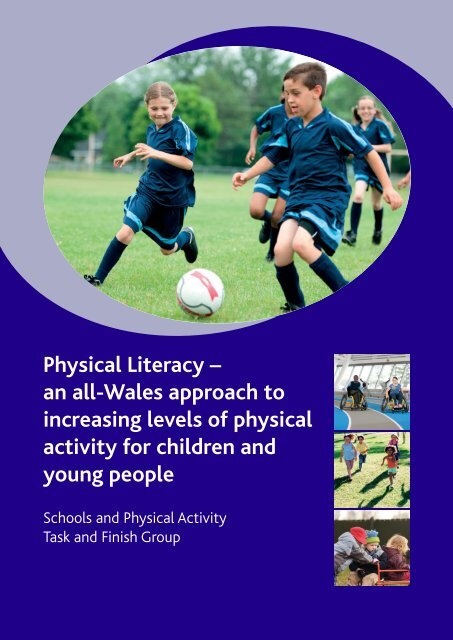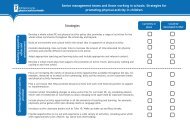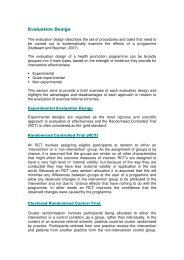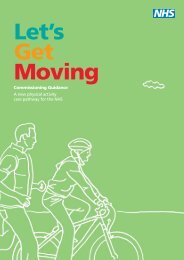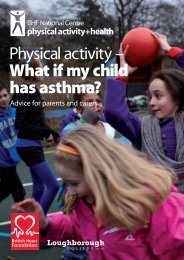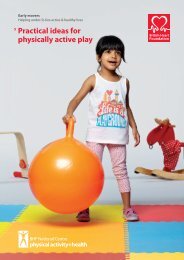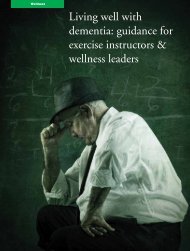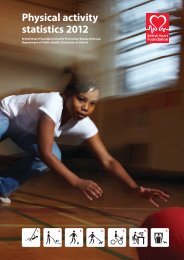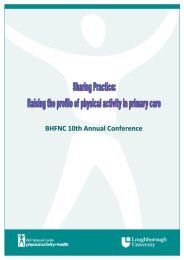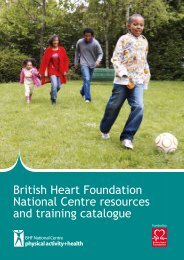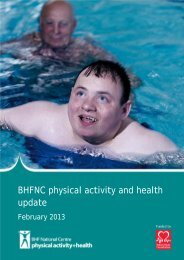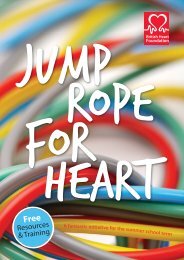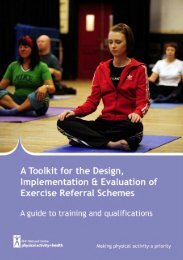Physical Literacy - Sport Wales
Physical Literacy - Sport Wales
Physical Literacy - Sport Wales
Create successful ePaper yourself
Turn your PDF publications into a flip-book with our unique Google optimized e-Paper software.
<strong>Physical</strong> <strong>Literacy</strong> –<br />
an all-<strong>Wales</strong> approach to<br />
increasing levels of physical<br />
activity for children and<br />
young people<br />
Schools and <strong>Physical</strong> Activity<br />
Task and Finish Group
Recommendations from the Schools and <strong>Physical</strong> Activity Task and Finish Group looking at how<br />
to develop the roles of schools in increasing the levels of physical activity in children and young<br />
people.<br />
Digital ISBN 978 0 7504 9580 6<br />
© Crown copyright June 2013<br />
WG18849
Contents<br />
Section 1: Background to the Group and its purpose 1<br />
Section 2: Approach 2<br />
Section 3: Membership 3<br />
Section 4: The Task and Finish Group recommendation 4<br />
Section 5: Context 8<br />
Section 6: Agenda themes 12<br />
Appendix A<br />
Supporting papers tabled at Task and Finish Group<br />
meetings 17<br />
Appendix B: Glossary 18<br />
Appendix C: Referenced material 19
Section 1: Background to the Group and its purpose<br />
The Schools and <strong>Physical</strong> Activity Task and Finish Group was convened by the<br />
Minister for Housing, Regeneration and Heritage (whose responsibilities included<br />
<strong>Sport</strong>), and the Minister for Education and Skills, to provide recommendations to the<br />
Welsh Government on how to develop the roles of schools in increasing the levels of<br />
physical activity in children and young people.<br />
It was announced by the Minister for Housing, Regeneration and Heritage on<br />
19th June 2012 as part of a Statement in Assembly Plenary on Active Children and<br />
Young People.<br />
The main purpose of the Task and Finish Group was to operationalize the<br />
Programme of Government commitment ‘to make physical literacy as important a<br />
development skill as reading and writing.’ (For the full Terms of Reference, please<br />
refer to Appendix A)<br />
1
Section 2: Approach<br />
The opportunity provided to the group by the Welsh Government was to produce a<br />
report that was progressive in its outlook and well evidenced by international good<br />
practice. It was also important that recommendations offered hard solutions to the<br />
most critical issue; children’s levels of physical activity and the connection with their<br />
health.<br />
The Group’s knowledge of the Welsh and International landscape was extremely<br />
useful, not only in terms of recognising good practice and existing barriers, but<br />
meant it was able to construct practical, positive, and realistic solutions to<br />
long-standing problems.<br />
The last formal review of this area in the form of a Government Task and<br />
Finish Group reported in 2001, and its findings were helpful in providing background<br />
context. However, the political landscape of <strong>Wales</strong> has changed significantly during<br />
the last twelve years, and the development of devolution has offered a massive<br />
opportunity to look forward, and to offer something different, visionary and<br />
transformational which would help <strong>Wales</strong>’s ambition to be a world-leading nation in<br />
sport and physical activity.<br />
The Group met monthly over a six-month period and the topics investigated included<br />
Environment, Facilities, Inspection, Curriculum, Teacher Training (including Initial<br />
Teacher Training and Continuing Professional Development) and <strong>Physical</strong> <strong>Literacy</strong>.<br />
As well as looking at the specific topic areas, the Group also considered<br />
recommendations from the point of view of being ‘aspirational’, ‘strategic’, and<br />
‘operational’, which they used to cross reference their discussions.<br />
2
Section 3: Membership<br />
Members of the Task and Finish Group were:<br />
• Chair - Tanni Grey-Thompson<br />
• Secondary Head teacher - Haydn Davies, Ysgol Gyfun, Llangefni<br />
• <strong>Physical</strong> Education Advisor - Judith Davies, originally working with ESIS<br />
• Primary Head teacher - Kate Fox-Parry, Ysgol Caernant, Connah’s Quay<br />
• Secondary Head teacher - Janet Kingston, Ysgol Greenhill, Tenby<br />
• Chair of <strong>Sport</strong> <strong>Wales</strong> - Laura McAllister<br />
• University lecturer - Paul Rainer, The University of South <strong>Wales</strong><br />
• Primary Deputy Head teacher - Menna Sweeney, Ysgol Gynradd<br />
Plascrug, Aberystwyth<br />
• HMI Inspector - John Thomas, Estyn<br />
The Group, along with their significant experience in this area, was able to call upon<br />
many other contributors and research which included (please see Appendix A for a<br />
list of submitted papers):<br />
• Young Ambassadors<br />
• Youth Forum<br />
• NGBs of <strong>Sport</strong> - through WSA<br />
• Asked schools to send in ideas - limited response<br />
• Association of School and College Leaders Conference - 160 delegates<br />
• Professor Ralph Tabberer<br />
• The Urdd<br />
• Julia Longville - Cardiff Metropolitan University<br />
• Marianne Mannello - Play <strong>Wales</strong><br />
• Jane Lorimer - Sustrans<br />
• Anne Hamilton - The Welsh <strong>Sport</strong>s Association<br />
• Professor Margaret Talbot<br />
• <strong>Sport</strong>sleaders UK<br />
3
Section 4: The Task and Finish Group recommendation<br />
<strong>Physical</strong> Education becomes a core subject in the national<br />
curriculum<br />
The Group discussed a number of potential recommendations to achieve the<br />
Welsh Government’s brief. It became clear that the Group did not wish to publish a<br />
long list of recommendations that might prove difficult to implement, or that could<br />
form part of a complex jigsaw puzzle of changes. This would risk not addressing the<br />
pivotal and deep seated-concerns around levels of physical activity and the health of<br />
our young people in <strong>Wales</strong>.<br />
Given the Welsh Government’s commitment to making physical literacy as important<br />
a development skill as reading and writing, the Group felt that changing the status of<br />
physical education is the only credible and secure way of ensuring this. The<br />
seriousness with which the Welsh Government has approached systemic and<br />
long-standing health, well-being and educational problems is to be commended, and,<br />
we felt that making physical education a core subject in the National Curriculum in<br />
<strong>Wales</strong> will stimulate significant health and educational attainment benefits for<br />
generations to come (see ‘The Human Capital Model’ in ‘Designed to Move’,<br />
Appendix C)<br />
The current core subjects in <strong>Wales</strong> are - English, Welsh (as a first language),<br />
mathematics, and science. Currently physical education is a Foundation subject. The<br />
Group believes that making physical education a core subject would give the subject<br />
the same status as mathematics, Welsh and English, with measurable and<br />
significant outcomes for making physical literacy as important a development skill as<br />
reading and writing.<br />
As a core subject, schools would need to give greater priority to provision for, and<br />
outcomes in physical education. As a result:<br />
• Teachers would be required to be competent to deliver the subject on<br />
completion of their initial teacher training;<br />
• Well qualified, specialist teachers would be needed to work with schools to<br />
ensure high-quality provision;<br />
• Standards and provision in physical education would be rigorously<br />
reviewed in school, both by the educational consortia and by Estyn<br />
• Progress would be regularly measured.<br />
The Group also believed that <strong>Physical</strong> Education must also be supported by a<br />
National <strong>Physical</strong> <strong>Literacy</strong> Framework, in a similar way to the national frameworks for<br />
numeracy and literacy. Although such a framework currently does not exist for<br />
<strong>Physical</strong> Education, the group strongly felt that this was necessary to ensure that the<br />
outcome of delivering high quality physical education would be physically literate<br />
young people.<br />
4
Research across the world has indicated that physical education does not have a<br />
status comparable to that of a 'core' subject in any other country. However, this<br />
research has demonstrated how a number of other countries take physical<br />
education, physical activity and physical literacy particularly seriously in their<br />
educational programmes. For example in:<br />
• Canada: the Government provides support for <strong>Physical</strong> <strong>Literacy</strong><br />
programmes in schools and also encourages parents to take an active role<br />
in their children's development (see section under ‘Canadian Data’,<br />
Appendix C).<br />
• Scotland: where physical activity rates are particularly low, the<br />
Government has recently reviewed how physical education is delivered<br />
and has improved the time allocated to physical education at initial teacher<br />
training, ensured teachers in all schools have access to advice and<br />
support from expert practitioners and increased the time allocated for<br />
physical education (see Health Scotland, Appendix C).<br />
• Finland: where physical activity rates are high, physical education is<br />
regarded as a priority and the importance of regular <strong>Physical</strong> Activity is<br />
recognised and provided for on a daily basis (see Appendix C for<br />
supporting links).<br />
These examples highlight some of the critical elements that would need to be<br />
implemented if the status of physical education was changed in <strong>Wales</strong>.<br />
Every child’s entitlement to high-quality physical education was the crucial<br />
starting point for the group’s deliberations. We felt that this was critical for children<br />
and young people to develop the necessary skills to encourage enjoyment, and to<br />
underpin lifelong health active lifestyles and well-being.<br />
The following actions were identified by the group as being important in realising this<br />
entitlement:<br />
a. <strong>Physical</strong> <strong>Literacy</strong> - an outcome of delivering high-quality physical education<br />
and school sport programmes in all Welsh schools would enable every child to<br />
become physically literate and enjoy taking part in sport and physical activity<br />
throughout their lives. To support this, a National <strong>Physical</strong> <strong>Literacy</strong> Framework<br />
would need to be developed, supported by a suite of measures to evaluate<br />
progress in developing physically literate young people.<br />
A crucial preliminary requirement will be to develop a better and common<br />
understanding of what is meant by the concept of physical literacy. Moreover,<br />
this must be understood not just by professionals in education, health and<br />
sport, but equally by young people themselves and their parents.<br />
(See definition of <strong>Physical</strong> <strong>Literacy</strong>`, Appendix B).<br />
b. Collaboration – Changing the status of physical education in schools would<br />
ensure greater connectivity between physical education and other curriculum<br />
subjects, in turn stimulating a more focused whole school approach to<br />
promoting sport and physical activity and developing physical literacy. It is also<br />
5
important to recognise that effective partnerships are crucial to ensuring there<br />
is a seamless pathway across the school, extra-curricular and community<br />
activity.<br />
c. Specialist physical education teachers - If young people are to have the<br />
opportunities to achieve their full potential and have the motivations and skills<br />
to remain physically active, it is critical that all primary teachers need to be<br />
confident and competent to deliver this subject. All schools need to have<br />
access to well-qualified, specialist teachers, who would continually work with<br />
schools to ensure the delivery of high-quality physical education programmes<br />
and, who could identify and promote best practice. This support would also<br />
facilitate the smooth transition between primary and secondary schools and<br />
support more effective links between school and community activity.<br />
(See ‘Bridging the Gap - But Mind You Don’t Fall. Primary <strong>Physical</strong> Education<br />
Teachers Perceptions of the Transition Process to Secondary School’,<br />
Appendix C)<br />
d. Initial Teacher Training and Continuing Professional Development - The<br />
amount of time given to physical education in Initial Teacher Training<br />
programmes is severely limited. This aspect of training needs to be<br />
dramatically improved to establish suitable conditions to deliver high-quality<br />
physical education programmes in all schools. Continuing Professional<br />
Development should be formalised and become an essential requirement for<br />
all teachers so they can acquire the skills and expertise to deliver consistently<br />
high-quality and motivating lessons that engage, challenge and inspire all<br />
pupils.<br />
We believe that elevating physical education to core subject status would help<br />
establish <strong>Wales</strong> as a world leader in terms of the priority and emphasis given<br />
to physical education, physical activity and sport within schools. This would<br />
contribute to improved levels of physical literacy throughout life and<br />
demonstrate the Welsh Government’s commitment to active, healthy lifestyles<br />
for all citizens helping, in the process, to address significant, systemic health<br />
problems.<br />
6
Section 5: Context<br />
‘The pandemic of physical inactivity should be a government priority’ according to the<br />
‘The Lancet’ report (Vol. 380, July 2012). It is encouraging to see that the<br />
Welsh Government is committed to this priority. It is therefore a natural point in time<br />
to review what investing in our children’s future through improved provision for<br />
physical education and school sport might look like. Current increases in childhood<br />
obesity will have huge impact on the future health budget in <strong>Wales</strong>. Changing the<br />
status and quality of physical education programmes and increasing physical activity<br />
levels are essential to prevent the crisis of this ticking time bomb. (See 'The<br />
Compounding Costs of <strong>Physical</strong> Inactivity over a Lifetime’, in 'Designed to Move',<br />
Appendix C).<br />
It has been widely acknowledged that a contributing factor to winning the<br />
Olympic and Paralympic Games in 2012 was the promise of a lasting legacy (in all<br />
its forms, from improving participation rates, to better facilities, and the wider<br />
contribution of volunteers etc.).<br />
The London 2012 Olympic and Paralympic Games provided inspirational moments<br />
for a significant number of people, and it is important to keep tracking these trends<br />
across geographical areas, sports and age groups. The participation figures that<br />
have recently been published by <strong>Sport</strong> <strong>Wales</strong> have been promising: sports such as<br />
gymnastics, hockey, swimming, cycling, boxing, and athletics have all seen<br />
significant increases in participation (ranging from 12 - 39%), while many new clubs<br />
in these sports, plus a remarkable 30 new canoeing clubs, have been set up to cope<br />
with the surge in demand inspired by the Games.<br />
It is also likely that the large contingent of Welsh athletes competing in the<br />
Commonwealth Games in Glasgow in 2014 will provide an additional positive focus.<br />
But major events on their own will not drive a whole scale, long term change in<br />
participation rates for those who are the hardest to reach. Even with the current<br />
positive figures that have been currently recorded, this has been achieved as a result<br />
of a huge amount of work from several organisations and individuals. Changing the<br />
status and importance of physical education in schools and improving physical<br />
activity levels can help build on the current positive figures and impact long after the<br />
Games are over.<br />
The risk of doing nothing<br />
Data from the Welsh Health Survey indicated that between 2007 and 2012 physical<br />
activity levels in children and adults were relatively stable. In 2011, just over half<br />
(51%) of children aged between 4 and 15 reported five or more active days in the<br />
past week and just over one in ten (12%) reported zero active days. Currently 28%<br />
of Primary pupils are regularly active and 26% of Secondary pupils are regularly<br />
active. (See ‘Hooked on <strong>Sport</strong>’, <strong>Sport</strong> <strong>Wales</strong> School <strong>Sport</strong> survey data, Appendix C).<br />
Improving the quality of physical education programmes would form part of a wider<br />
agenda and help develop the right attitude to maintaining a healthy lifestyle.<br />
However, if we look at the obesity figures for <strong>Wales</strong> which were clearly highlighted in<br />
the National Assembly of <strong>Wales</strong> Quick Guide (January 2012), it states that:<br />
8
‘Overweight and obesity in children represent serious public health problems in<br />
<strong>Wales</strong>. The rates of childhood obesity in <strong>Wales</strong> are the highest in the UK, with about<br />
36 per cent of children (under 16 years old) being overweight or obese in 2010. This<br />
includes around 19 per cent of children classified as obese, 23 per cent of boys and<br />
16 per cent of girls.’<br />
The Quick Guide goes on to say that in ‘recent years, rates of childhood obesity<br />
have remained consistently high and there was a recorded rise in the percentage of<br />
children aged between two and fifteen years old classed as obese from 16 per cent<br />
in 2008, to 19 per cent in 2010’<br />
It must be a cause of serious concern that five of the top six obesity hotspots<br />
detailed are in <strong>Wales</strong> and, regardless of the current positive participation trends, if<br />
action is not taken, then there could be devastating consequences for the long term<br />
health of the Welsh nation. This is especially important as the childhood obesity rate<br />
is predicted to continue to rise.<br />
The recently released comparative research, ‘Designed to Move', (see Appendix C)<br />
shows that 'today's generation will be the first to have a shorter life expectancy than<br />
their parents’. The authors of ‘Design to Move’ place the cost of inactivity to the<br />
UK population at $33 billion (because of the nature of the comparative study, the<br />
US dollar has been used as the currency). They go on to say that 'focusing on<br />
children before the age of 10 could change the trajectory for the next generation'<br />
underlining the rationale for our principal recommendation here.<br />
The risks of inactivity into adulthood are well known, and include the risk of heart<br />
disease and type II diabetes amongst others. This then has the potential to lead to<br />
increased cost to not only the NHS but other areas of support. This must be<br />
considered in any cost benefit analysis as the recent Welsh Government<br />
commissioned study estimates this figure to be £73m per annum. (See 'The<br />
Welsh Government, Obesity and Alcohol Costs to your NHS', Appendix C)<br />
The Welsh Government has repeatedly stated its commitment to increasing levels of<br />
<strong>Physical</strong> Activity in order to help tackle rise in obesity in children and young people.<br />
This commitment is to be welcomed.<br />
While there is a clear challenge to improve levels of physical activity amount all<br />
young people being involved, it has long been recognised that there is an additional<br />
risk of young girls dropping out of physical activity and sport. <strong>Sport</strong> <strong>Wales</strong> recently<br />
conducted a qualitative piece of research looking at the drop off in girls and boys<br />
between the ages of 14 and 21. (See <strong>Sport</strong> <strong>Wales</strong> Publications, ‘<strong>Sport</strong>s Participation<br />
Amongst 14 - 21 Year Olds’, Appendix C). This research contributes to the reports<br />
from the Youth <strong>Sport</strong> Trust and the Women’s <strong>Sport</strong> and Fitness Foundation, the<br />
latter reporting concerning data that 80% of women are not active enough to be<br />
healthy. (See The Women’s <strong>Sport</strong> and Fitness Foundation, Appendix C)<br />
Any work in this area must also be inclusive to ensure that disabled children or those<br />
with special educational needs are also able to access good quality physical<br />
education.<br />
9
Recent research suggests that physical education in schools is currently turning<br />
many pupils off physical education rather than engaging with them. While pupils are<br />
fairly positive about physical education lessons, especially in primary school<br />
(73% say they enjoy physical activity ‘a lot’ and only 4% say they don’t enjoy it ‘at<br />
all’. Enjoyment does decrease in secondary schools and 50% enjoy it ‘a lot’, 36%<br />
say ‘a little’ and 14% ‘not at all’). (See <strong>Sport</strong> <strong>Wales</strong> Publications, ‘Attitudes to School<br />
<strong>Sport</strong>’, Appendix C)<br />
Throughout the work of the Group, it was recognised that it is not just what is<br />
‘offered’ in schools that is important, but what children actually get to ‘do’. Engaging<br />
with young people in the decision making process is critical to making sure that not<br />
only the ‘offer’ meets their needs but the way lessons are delivered is engaging for<br />
them. This does mean that a wide variety of opportunities across various sports and<br />
physical activities must be offered.<br />
In order to achieve widespread change, then there also has to be an effective<br />
workforce to deliver physical education and school sport, as well as a framework and<br />
meaningful review and evaluation points. It should also be remembered that physical<br />
education should be fun, challenging and rewarding, resulting in physically literate<br />
young people.<br />
In Australia, strong evidence has emerged of a negative impact on the health and<br />
well-being of children of the 21st century when they are not afforded opportunities for<br />
regular well-designed physical education provided by Specialist Teachers; when they<br />
are insufficiently active; and when they do not participate in any form of organised<br />
sport. (See The Look Lifestyle Study, Appendix C).<br />
Challenges<br />
Making <strong>Physical</strong> Education a core subject in the National Curriculum is clearly a bold<br />
move. It will require a change in mindset especially as to how the subject is valued<br />
by all stakeholders. This needs to be linked to the importance of physical activity and<br />
the ‘ticking time bomb’ of obesity and consequent costs to the health budget. The<br />
value placed on being active and healthy needs to support this recommendation.<br />
The <strong>Physical</strong> Education and School <strong>Sport</strong> (PESS) programme has to date developed<br />
a wealth of high-quality resources and training for teachers and contributed to<br />
increased levels of teaching expertise. Where schools recognise the importance of<br />
high-quality physical education they are accessing the programme. However, this<br />
engagement with the PESS programme is not consistent across <strong>Wales</strong> and<br />
developing physically literate young people is not always seen as a priority in all<br />
schools in <strong>Wales</strong>. The considerable commitment and success of the PESS<br />
programme has helped establish sound foundations for preparing the way for<br />
physical education to become a core subject.<br />
All of this work to date would form the foundations for preparing the way for physical<br />
education to become a core subject. The budget that is currently secured for the<br />
PESS programme (in 2013 – 2014 it stands at £2.35m) should, from August 2014,<br />
be used to prepare the landscape ready for delivering <strong>Physical</strong> Education as a core<br />
subject from September 2015. There should be a seamless transition from the<br />
10
current programme, including retention of expertise to ensure that there is a<br />
consistent approach to developing the following key components:<br />
• Selection of teachers across <strong>Wales</strong> that can be developed as expert<br />
teachers of physical education<br />
• A programme of training designed that supports the development of these<br />
expert teachers<br />
• A framework for the development of physical literacy<br />
• A suite of measures that will identify progress in developing physically<br />
literate young people<br />
With these elements in place, there would be enough expert teachers across <strong>Wales</strong><br />
who would be able to rigorously review the delivery of <strong>Physical</strong> Education in all<br />
schools. The physical literacy framework will support the training and development of<br />
a confident workforce and the suite of measures that will be developed will enable<br />
consortia teams and Estyn to check progress on developing physically literate young<br />
people. The cost of implementing this in 2015 is estimated at being £5 million per<br />
annum.<br />
11
Section 6: Agenda themes<br />
a) The status of <strong>Physical</strong> Education in the Curriculum<br />
The group was unanimous that the status of physical education should be altered to<br />
become a Core Subject of the National Curriculum in <strong>Wales</strong>. This was because, in<br />
order to change the way the subject is delivered and received by all children,<br />
physical education needs to be raised to a level where it will be rigorously monitored<br />
(for quality of delivery) and the outcomes regularly and robustly reviewed. This would<br />
include: developing expertise on the ground to challenge quality of delivery, effective<br />
initial teacher training and on-going continuing professional development, to support<br />
a high-quality teaching force with the skills and expertise to provide consistently<br />
high-quality and motivating lesson that engage, challenge and inspire all pupils. It<br />
also demands establishing strong partnerships to enable the development of<br />
physically literate young people.<br />
<strong>Physical</strong> education should therefore share equal status with other core subjects. The<br />
positive value of adopting healthy lifestyles means physical education and physical<br />
activity should be developed and embedded across the curriculum to ensure all<br />
children acquire firm foundations for future active and healthy lives.<br />
Learning through moving is extremely important. Many youngsters consolidate their<br />
understanding through kinesthetic learning and many vital skills for employers in the<br />
21 st century can be learnt best through high quality physical education. Research<br />
has captured links between high quality physical education and increased attainment<br />
levels as well as better attendance records.<br />
b) <strong>Physical</strong> literacy<br />
There is a wealth of powerful empirical and anecdotal evidence to show the positive<br />
side of being physically active. By becoming physically literate, <strong>Wales</strong>’s young<br />
people will have the skills, confidence and be motivated to be regularly active<br />
throughout their lives.<br />
The Group accepted that there are many definitions of physical literacy. However,<br />
we found Margaret Whitehead’s, an eminent expert in this field, to be compelling.<br />
<strong>Physical</strong> literacy is:<br />
“A disposition acquired by human individuals encompassing the motivation,<br />
confidence, physical competence, knowledge and understanding that establishes<br />
purposeful physical pursuits as an integral part of their lifestyle.”<br />
(Margaret Whitehead February 2012 www.physical-literacy.org.uk)<br />
In Canada, physical literacy has been recognised as being an important outcome of<br />
education and they have made changes in their curriculum to enhance the<br />
development of physically literate young people.<br />
12
<strong>Physical</strong> literacy has also been used by some National Governing Bodies of sport as<br />
part of their Talent Pathways, underlining the importance of developing physical<br />
literacy at an early stage so as to nurture future talented athletes.<br />
The Group found the argument valid that early work on physical literacy in the school<br />
environment was an important preliminary for young people to develop the<br />
confidence and competencies to be active throughout their lives.<br />
There are a number of vehicles that can be used to achieve physical literacy. These<br />
might be physical education, physical activity and sport (in all its forms). One of the<br />
challenges is that many people interchange these three words and there needs to be<br />
greater clarity and understanding of the differences between them (see Appendix B<br />
for a full glossary).<br />
The Group also felt strongly that it was not just the responsibility of educationalist to<br />
understand and “own” physical literacy. Equally, parents and pupils must understand<br />
the concept and its benefits for educational attainment, health and well-being and<br />
physical activity. We feel that simple visual tools might be developed that could help<br />
translate the meaning of this rather complex term to promote levels of “buy in”.<br />
The Chief Medical Officer’s Guidelines for Children and Young People (5-18 Years)<br />
2011 provided some very practical guidelines: (UK government department of health<br />
July 2011). These guidelines stated that all children and young people should<br />
engage in moderate to vigorous intensity physical activity for at least 60 minutes and<br />
up to several hours every day.<br />
Vigorous intensity activities, including those that strengthen muscles and bones<br />
should be incorporated at least three days a week, and all children and young people<br />
should minimise the amount of time spend being sedentary for extended periods.<br />
However, the opportunity to be fit and healthy goes beyond the entitlement agenda.<br />
Every child’s experience should be appropriate to his or her individual needs. It<br />
should also be delivered in a fun, engaging, varied manner that constantly<br />
challenges their development.<br />
Having said this, the Group recognised that there is already a significant amount of<br />
positive work that is going on in schools and it is important that we continue to<br />
disseminate positive practice and experiences. However, it also felt that these should<br />
be the norm across <strong>Wales</strong>, rather than a post code lottery in terms of children’s<br />
experiences in such a fundamental area.<br />
c) Teacher training<br />
We were clear that improving the quality of delivery of physical education will depend<br />
on the knowledge, experience, confidence and enthusiasm of the teacher.<br />
The Spence research currently showed that 39% of primary teachers lacked the<br />
confidence to teach physical education, and 55% received less than 10 hours of<br />
training (See Spence Research, Appendix C)<br />
13
Although other data may show slightly different numbers, the debate about the<br />
adequacy of preparing teachers for the classroom in this area remains unchanged.<br />
The challenge to teach physical education to primary level children, who may have<br />
widely different levels of ability and enthusiasm, by teachers with relatively little<br />
training is significant. It would surprise many that a teacher would be required to<br />
deliver physical education at primary level, with perhaps very little practical<br />
experience, or such limited number of hours of training. While it is important to<br />
recognise that there are many exceptional teachers, if this occurred in mathematics,<br />
science, English, Welsh or indeed any other subject, there would be universal<br />
outrage and parents would have justifiable concerns. Yet, this is exactly what can<br />
happen in physical education. It is not enough to rely on teachers having had a good<br />
experiences themselves in school, nor at primary level, leaving it to those staff who<br />
are considered 'sporty'. This is a random, ad hoc approach that would not be<br />
tolerated in other curriculum subject areas.<br />
For some children who are talented, or who perhaps are already involved in sport<br />
outside school, there are fewer problems. However, if children do not develop the<br />
appropriate skills at a young age, then many will struggle to enjoy physical activity<br />
and thus not continue to participate or engage in activities outside the curriculum<br />
lessons. This has massive long term implications for their health and well-being.<br />
We feel the importance of Initial Teacher Training and Continuing Professional<br />
Development should not be underestimated. Good teachers should not just deliver<br />
stimulating and challenging lessons but be able to communicate, teach, offer<br />
feedback, encourage talent and help others along their own personal pathway. If<br />
teachers receive insufficient support and guidance as part of the initial teacher<br />
training, then some teachers will lack the confidence and motivation to deliver varied,<br />
fun and inclusive physical education lessons.<br />
Clearly, the culture of schools is shaped significantly by head teachers. It is critical<br />
that head teachers recognise the value and importance of good physical education<br />
programmes and support and promote the subject strongly in their schools.<br />
(See ‘From policy to practice: the challenges of providing high quality physical<br />
education and school sport faced by head teachers within primary schools,<br />
Appendix C)<br />
It should be acknowledged that a Welsh Government review on Teacher Training<br />
was being conducted by Professor Ralph Tabberer which ran concurrently to this<br />
review. Moreover, there is was also a major review of the curriculum in progress.<br />
This would therefore be an optimum time to implement this recommendation and for<br />
it to be supported within the other current reviews.<br />
d) Landscape/school<br />
We acknowledge that there are many pressures on the busy school day and many<br />
initiatives taking place in schools to improve pupil’s level of literacy and numeracy.<br />
Extending the length of the school day to increase the time available for physical<br />
activity was not considered a viable solution to the issue of participation in physical<br />
activity. However, there has been much positive work to extend and improve<br />
14
opportunities for young people to participate in extracurricular sport, including the<br />
<strong>Sport</strong> <strong>Wales</strong> schemes, Dragon <strong>Sport</strong> and Multiskills, and the 5 x 60 programme.<br />
It was not for the Group to make any recommendations about the building of school<br />
sites but it did recognise that good facilities and layout are extremely important. The<br />
Group were presented with examples of such facilities.<br />
The Group also recognised that increasing activity would also be assisted if there<br />
were continuing links to out of school activities, such as other enrichment<br />
experiences or good quality play/sport opportunities supported by<br />
National Governing Bodies. Also active travel and healthy eating projects are very<br />
important to the overall picture as was evidenced in the schemes outlined by<br />
Sustrans, the Welsh <strong>Sport</strong>s Association (WSA) and Play <strong>Wales</strong>. The information that<br />
they provided was extremely useful in setting the wider context and importance of<br />
physical activity which can wrap around the school day and should also be widely<br />
encouraged.<br />
A number of issues were discussed around the transition of children between<br />
schools (particularly Key Stage 2 and Key Stage 3). This aspect is also linked to the<br />
work on Teacher Training and <strong>Physical</strong> <strong>Literacy</strong>.<br />
The Group also discussed the benefits of sporting role models as an inspiration to<br />
children and young people, and how these role models can help promote greater<br />
levels of sustained participation. There was some experience of such schemes, and<br />
the measurable, sustained benefits of each may vary. The key is to ensure not only<br />
good value for money, but also longer term tangible benefits in terms of sustained<br />
participation in sport and physical activity. With the 2014 Glasgow Commonwealth<br />
Games ahead, there will clearly be new opportunities to help motivate children to do<br />
more physical activity and sport through athlete role models.<br />
e) Inspection<br />
The role of inspection was debated in depth and it also crossed in to other areas of<br />
the Group’s consideration.<br />
Under Estyn’s current inspection and framework arrangements inspectors do not<br />
evaluate the quality of teaching in physical education or any other subject.<br />
A comprehensive paper on the current arrangements was made available to the<br />
Group and extensively discussed in the context of our recommendation.<br />
The group discussed the <strong>Sport</strong> <strong>Wales</strong> Biennial School <strong>Sport</strong> Survey and agreed that<br />
the reports generated from the information provided unique and invaluable evidence<br />
to schools. The reports give a detailed picture about their provision of sport and<br />
physical education as well as young people’s participation rates. This critical<br />
evidence is extremely useful to schools to inform their planning and for Estyn to<br />
scrutinize this trend data over time.<br />
15
In summary<br />
This report and its single recommendation – ‘<strong>Physical</strong> Education becomes a core<br />
subject in the National Curriculum in <strong>Wales</strong>’- will have the power to change the lives<br />
of the next generation, ensuring all children in <strong>Wales</strong> experience high quality<br />
<strong>Physical</strong> Education. It would mean <strong>Wales</strong> leading the way in the UK and beyond as a<br />
healthy, active, fit nation.<br />
16
Appendix A: Supporting papers tabled at Task and Finish<br />
Group meetings<br />
Meeting 1: 9 October 2012<br />
SPATFG/12/01: Terms of Reference and Proposed Work Schedule<br />
SPATFG/12/01a: Terms of Reference<br />
SPATFG/12/01b: Background Papers<br />
SPATFG/12/01c: Mode of Operation<br />
SPATFG/12/02:<br />
SPATFG/12/02:<br />
Definition of <strong>Physical</strong> <strong>Literacy</strong><br />
Annex1 Definition of <strong>Physical</strong> <strong>Literacy</strong> Final<br />
Meeting 2: 13 November 2012<br />
SPATFG/12/03: PE in the School Curriculum<br />
SPATFG/12/04: PE Curriculum (<strong>Sport</strong> <strong>Wales</strong>)<br />
SPATFG/12/05: Whole School Approach to <strong>Physical</strong> Activity<br />
SPATFG/12/06: Urdd Gobaith Cymru – Business Plan 2012-13<br />
Meeting 3: 8 January 2013<br />
SPATFG(3)/13/01: Revised Mode of Operation<br />
SPATFG(3)/13/02: Estyn Inspection Arrangements<br />
Meeting 4: 12 February 2013<br />
SPATFG(4)/13/01: Initial Teacher Training (<strong>Sport</strong> <strong>Wales</strong>)<br />
SPATFG(4)/13/02: Initial Teacher Training/Continuing Professional Development<br />
(Welsh Government)<br />
SPATFG(4)/13/03: <strong>Physical</strong> <strong>Literacy</strong><br />
SPATFG(4)/13/04: Young Ambassadors General Feedback<br />
SPATFG(4)/13/04b: Young Ambassador Questionnaire Response<br />
SPATFG(4)/13/05: Questionnaire Summary<br />
Meeting 5: 25 March 2013<br />
SPATFG(5)/13/01: School Environment (Play <strong>Wales</strong>)<br />
SPATFG(5)/13/02: School Environment (Sustrans)<br />
SPATFG(5)/13/03: School Club Links (Welsh <strong>Sport</strong>s Association)<br />
SPATFG(5)/13/04: 21 ST Century Schools and the Education Capital Programme<br />
SPATFG(5)/13/05: School Environment (<strong>Sport</strong> <strong>Wales</strong>)<br />
SPATFG(5)/13/06: Dragon <strong>Sport</strong> and 5X60 (<strong>Sport</strong> <strong>Wales</strong>)<br />
SPATFG(5)/13/07: Change4Life <strong>Wales</strong><br />
SPATFG(5)/13/08: School Environment – Transport<br />
SPATFG(5)/13/09: Youth Forum Feedback<br />
SPATFG(5)/13/10: <strong>Physical</strong> <strong>Literacy</strong> Definition<br />
SPATFG(5)/13/12: Top 5 Recommendations<br />
Copies of these documents are available online<br />
17
Appendix B: Glossary<br />
<strong>Sport</strong> is defined as: "all forms of physical activity which, through casual or organized<br />
participation, aim at expressing or improving physical fitness and well-being, forming<br />
social relationships, or obtaining results in competition at all levels."<br />
(The Council of Europe)<br />
Health is defined as: "a state of physical, mental, and social well-being, not simply<br />
absence of disease".<br />
(The World Health Organisation)<br />
<strong>Physical</strong> Activity is defined as: "all movements in everyday life, including work,<br />
recreation, exercise and sporting activities."<br />
(The World Health Organisation)<br />
Fitness is defined as: "fitness is the ability to perform moderate to vigorous levels of<br />
physical activity without undue fatigue and the capability of maintaining such ability<br />
throughout life."<br />
(The American College of <strong>Sport</strong>s Medicine)<br />
<strong>Sport</strong>s <strong>Literacy</strong> is defined as: "a generic set of basic sports skills."<br />
(Department of Culture, Media & <strong>Sport</strong>)<br />
Active Recreation is defined as: any moderate intensity physical activity carried out<br />
in leisure time including activities such as dancing, aerobics or brisk walking.<br />
<strong>Physical</strong> <strong>Literacy</strong> is defined as: “A disposition acquired by human individuals<br />
encompassing the motivation, confidence, physical competence, knowledge and<br />
understanding that establishes purposeful physical pursuits as an integral part of<br />
their lifestyle.’’<br />
(Margaret Whitehead 2012).<br />
<strong>Physical</strong> Education - “<strong>Physical</strong> education develops physical competence so that all<br />
children can move efficiently, effectively and safely and understand what they are<br />
doing. The outcome, physical literacy, is an essential basis for their full development<br />
and achievement”.<br />
Obesity - (defined as BMI>30). Individuals with severe or morbid obesity (BMI>35)<br />
(The Welsh Government)<br />
18
Appendix C: Referenced material<br />
‘Bridging the Gap - But Mind You Don’t Fall. Primary <strong>Physical</strong> Education Teachers<br />
Perceptions of the Transition Process to Secondary School’, Paul Rainer, University<br />
of South <strong>Wales</strong>. Currently under review in the International Journal of Primary<br />
Education.(Research on Transition from KS2 to KS3)<br />
Canadian data -<br />
http://activeforlife.ca/play-tools-assess-physical-literacy-in-children/<br />
http://www.sirc.ca/news_view.cfm?id=52261<br />
Canadian <strong>Sport</strong> for Life Movement -<br />
http://canadiansportforlife.ca/sites/default/files/resources/Activation_Strategy_Jan22<br />
_finalEN_web.pdf<br />
Designed to Move - Research published in 2013 - specific link on the Human Capital<br />
Model - http://designedtomove.org/downloads/Human_Capital_Model.pdf<br />
Designed to Move - full document -<br />
http://designedtomove.org/downloads/Executive_Summary.pdf<br />
Finnish data -<br />
http://www.guardian.co.uk/befit/story/0,15652,1385645,00.html<br />
http://www.oph.fi/download/145366_<strong>Physical</strong>_activity_and_learning.pdf<br />
‘<strong>Physical</strong> <strong>Literacy</strong>: Throughout the Lifecourse’, Whitehead, ME (Ed), 2010, London,<br />
Routledge<br />
‘From policy to practice : the challenges of providing high quality physical education<br />
and school sport faced by head teachers within primary schools’, by Paul Rainer,<br />
Brendan Cropley, Stuart Jarvis and Rob Griffiths, available online 21 November<br />
2011, and published in the <strong>Physical</strong> Education and <strong>Sport</strong> Pedagogy<br />
(http://www.tandfonline.com/loi/cpes20)<br />
Scottish data -<br />
Health Scotland - http://www.healthscotland.com/physical-activity.aspx<br />
Spence research - quoted in http://www.youthsporttrust.org/newsmedia/news/2012/05/fears-for-future-health-of-nation's-young-people.aspx<br />
The Lancett Report (Vol, 380, July 2012)<br />
The Look Lifestyle Study : http://www.look.org.au/v2/?page_id=24<br />
National Assembly of <strong>Wales</strong> Quick Guide (January 2012) -<br />
http://www.assemblywales.org/qg12-0004.pdf<br />
<strong>Sport</strong> <strong>Wales</strong> Publication - ‘Attitudes to School <strong>Sport</strong>‘‘<br />
http://www.sportwales.org.uk/media/1090090/attitudes_to_school_sport_english.pdf<br />
<strong>Sport</strong> <strong>Wales</strong> Publication - ’<strong>Sport</strong>s Participation Amongst 14 - 21 Year Olds’ -<br />
19
http://www.sportwales.org.uk/research--policy/tools-and-resources/publications.aspx<br />
Women’s <strong>Sport</strong> and Fitness Foundation research -<br />
http://www.wsff.org.uk/system/1/assets/files/000/000/300/300/160c05d89/original/12<br />
732_Impact_report_2012_v5_0.pdf<br />
The Welsh Assembly Government, Obesity and Alcohol Costs to your NHS -<br />
http://wales.gov.uk/newsroom/healthandsocialcare/2011/110331obesity/?lang=en<br />
Youth <strong>Sport</strong> Trust, ‘Reviewing Global Practice, Primary and Secondary’<br />
http://www.youthsporttrust.org/news-media/news/2012/06/new-global-educationprogramme-offers-funding-andcpd.aspx?returnUrl=http%3a%2f%2fwww.youthsporttrust.org%2fsearch.aspx%3fsea<br />
rch%3dreviewing%2bglobal%2bpractise<br />
National <strong>Literacy</strong> Framework -<br />
http://learning.wales.gov.uk/resources/nlnf/?skip=1&lang=en<br />
‘The predicament of primary physical education: a consequence of ‘insufficient’ ITT<br />
and ‘ineffective’ CPD. Jo Harris, Lorraine Cale, and Halyley Musson, published by<br />
<strong>Physical</strong> Education and <strong>Sport</strong> Pedagogy<br />
Additional reading<br />
‘High Quality PE and <strong>Sport</strong> for Young People : A guide to recognising and achieving<br />
high quality PE and sport in schools and clubs’, Department for Education and Skills,<br />
Department for Culture, Media and <strong>Sport</strong>.<br />
“The role of leadership training during physical education in the school curriculum’,<br />
<strong>Sport</strong> Leaders UK<br />
‘International Position Statement on <strong>Physical</strong> Education’, November 2010,<br />
International Council of <strong>Sport</strong> Science and <strong>Physical</strong> Education.<br />
‘UK <strong>Sport</strong> Chief: Primary Pupils ‘unable to run or jump’’, (The Telegraph,<br />
Sunday 19 May, 2013) -<br />
http://www.telegraph.co.uk/education/educationnews/9806772/UK-<strong>Sport</strong>-chief-<br />
Primary-pupils-unable-to-run-or-jump.html<br />
YST Chief call for Specialist PE teacher in every Primary School -<br />
http://www.guardian.co.uk/education/2012/oct/03/specialist-pe-teacher-primaryschool<br />
‘Not enough strenuous activity’ in School PE -<br />
http://www.bbc.co.uk/news/education-21449610<br />
Select Committee Update -<br />
http://www.bbc.co.uk/schoolreport/22528783<br />
20
‘Blow to Olympic legacy as ‘schools are forced to cut sport’’, (The Telegraph, Sunday<br />
19 May, 2013) -<br />
http://www.telegraph.co.uk/education/educationnews/10062338/Blow-to-Olympiclegacy-as-schools-are-forced-to-cutsport.html?utm_source=dlvr.it&utm_medium=twitter<br />
‘School sport participation and the Olympic legacy. A survey of teachers, school<br />
games organisers and school sport partnership staff’, The Smith Institute<br />
http://www.smithinstitute.org.uk/file/School%20<strong>Sport</strong>s%20Participation%20Survey.pdf<br />
Reported many media stream, including -<br />
http://www.bbc.co.uk/sport/0/22565153<br />
http://www.afpe.org.uk/news-a-events<br />
http://m.guardian.co.uk/education/2013/may/17/michael-gove-blamed-childrenexercising<br />
British Heart Foundation -<br />
http://www.bhf.org.uk/plugins/PublicationsSearchResults/DownloadFile.aspx?docid=<br />
e9994c21-ec6c-4fad-b741-ad96bacd69ed&version=-<br />
21


